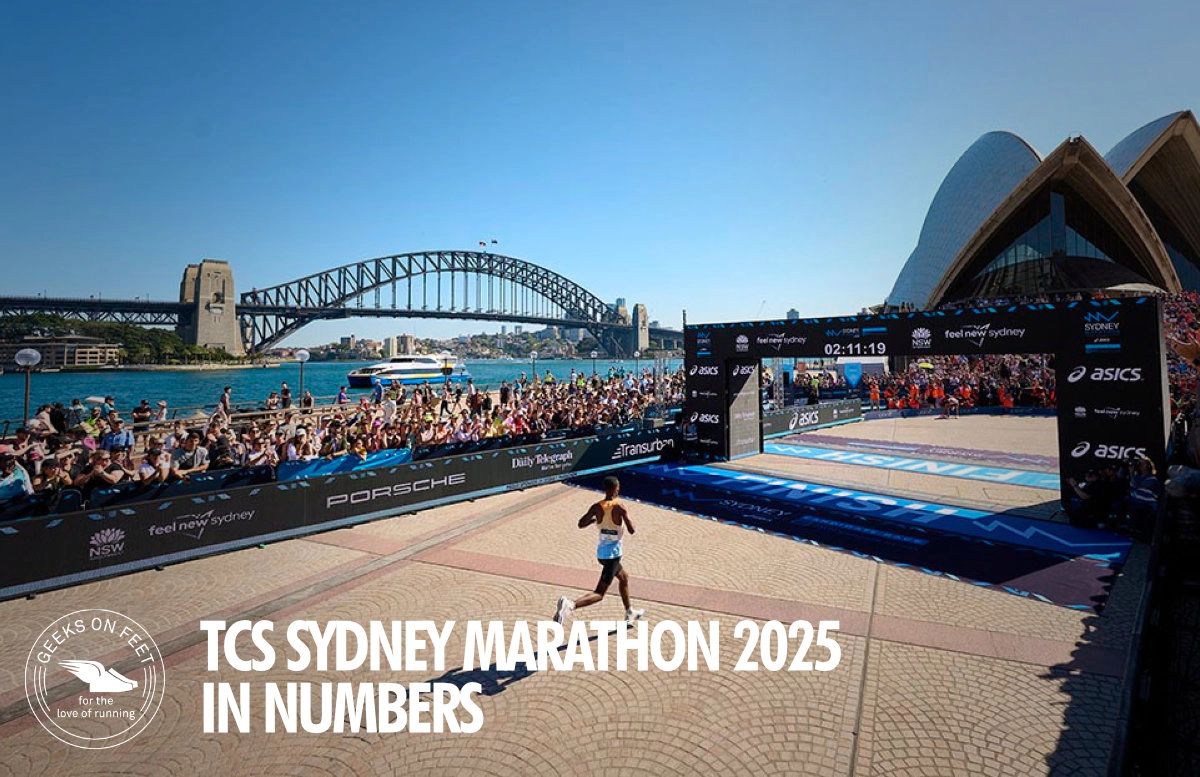
On 31 August 2025, the streets of Sydney saw more than 30,000 runners on the road. It marked the city’s arrival among the absolute elite of distance running. The TCS Sydney Marathon made its debut as the seventh Abbott World Marathon Major, joining Boston, New York, London, Berlin, Chicago, and Tokyo in the world’s most high-profile marathon series.
Sydney is now the first and only Major in the Southern Hemisphere. The race taps into Sydney’s storied history in athletics: first run in 2000 as a test event for the Sydney Olympics, and has grown from there. In this first year as a Major, the elite runners including Eliud Kipchoge, Sifan Hassan raced in Australia for the first time.
Out of 34,141 registered runners, 32,967 crossed the finish line, marking a finish rate of 96.6%. Sydney also stood out for its global reach, runners from 169 countries toed the line, making this first Major in the Southern Hemisphere one of the most internationally diverse editions yet.
While men made up roughly two-thirds of the field, the presence of over 11.4k women finishers is not bad at all.
Runners from across Australia made up the biggest part of the field, nearly 47% of the total field. From there, the marathon broadened out across the world. USA was the second-largest contingent with 3,410 finishers. Then came the United Kingdom and China, spanning the Top 3 honors across three continents. India’s presence is not bad either, with 21st among the number of finishers, just ahead of Brazil.
Looking by continents, Australia/Oceania at the top is not surprising at all. The second-largest presence however surprisingly came from Asia, with runners traveling from across the region from China and Indonesia to the Philippines, Japan, and India. Sydney’s location in the Southern Hemisphere clearly makes it a natural magnet for Asian runners, many of whom might otherwise have to travel long-haul to Europe or North America to chase a Major. Runners from Europe and North America together formed another large chunk of the field.
The most crowded part of the race was just around the 4-hour mark, where more than 3,100 runners finished. This aligns with what we often see in World Majors: the symbolic sub-4 target attracts a big portion of recreational marathoners, and Sydney was no exception.
The overall distribution follows an almost bell-shaped pattern. From about 3:30 to 4:30, the finish line was at its busiest, with each 10-minute bucket carrying close to 2,000+ runners. Earlier finishers were fewer, but still sizable with more than 1,300 runners who broke 3:30. On the other side, there is a long tail with curve stretches all the way past the 7-hour mark. Over 1,200 runners finished between 5:00–5:30, and a steady stream continued right past the 6- and even 7-hour marks.
About 1301 finishers achieved the Sub 3 mark, which is praise worthy given the rolling nature of the course. For reference Tokyo Marathon 2025, which has much flatter course has 1647 sub 3 finishers.
Sydney’s first year as a World Marathon Major drew a lively contingent from India. With 300+ Indian finishers across every age band.
Amit Lahekar (2:42:56) topped the Indian charts, finishing 202nd overall and inside the global top 200 men. A strong men’s front pack formed behind him: multiple Indians dipped under 3 hours ( Sanchit Agarwal – 2:50:42, Prashanth Narasimhan – 2:52:04, B J Vikram – 2:55:43, Karthik Anand – 2:56:38), showing some depth there.
| Overall Rank | Name | bib | Finish Time | Age Category | Category Rank | Gender Rank |
|---|---|---|---|---|---|---|
| 202 | Amit LAHEKAR | 1507 | 2:42:56 | 30-34 | 61 | 186 |
| 478 | Sanchit AGARWAL | 2568 | 2:50:42 | 25-29 | 89 | 450 |
| 535 | Prashanth NARASIMHAN | 1577 | 2:52:04 | 25-29 | 97 | 506 |
| 802 | B J VIKRAM | 1570 | 2:55:43 | 35-39 | 149 | 759 |
| 880 | Karthik ANAND | 1959 | 2:56:38 | 40-44 | 139 | 832 |
| 1355 | Shamik Pramod KANAIYA | 2921 | 3:00:46 | 35-39 | 230 | 1287 |
| 1684 | Nigel THOMAS MUKALUMPURATHU | 3852 | 3:05:33 | 25-29 | 299 | 1589 |
| 2281 | Shrey BHUTRA | 3298 | 3:11:07 | 30-34 | 472 | 2115 |
| 2630 | Aditya JAIN | 4966 | 3:14:02 | 40-44 | 424 | 2429 |
| 2827 | Sumit CHATLEY | 20664 | 3:15:21 | 35-39 | 450 | 2598 |
Deepa Nayak (3:21:28) led the Indian women, placing inside the top 400 women overall, yet another quality WMM performance from her. Close behind were Vandana Arora (3:28:18) and Sunmbul Rahman (3:35:43), anchoring a cluster of Indian women finishing 3:20–3:40 and reinforcing the rise of competitive amateur women from India.
| Overall Rank | Name | bib | Finish Time | Age Category | Category Rank | Gender Rank |
|---|---|---|---|---|---|---|
| 3736 | Deepa NAYAK | 2810 | 3:21:28 | 35-39 | 61 | 348 |
| 5111 | Vandana ARORA | 5836 | 3:28:18 | 45-49 | 53 | 605 |
| 6715 | Sunmbul RAHMAN | 12486 | 3:35:43 | 50-54 | 54 | 950 |
| 9585 | Kalyani SATIJA | 21987 | 3:48:10 | 40-44 | 256 | 1724 |
| 13558 | Ranjini GUPTA | 12520 | 4:01:10 | 45-49 | 343 | 2963 |
| 13779 | Manisha SRIVASTAVA | 22901 | 4:02:17 | 50-54 | 251 | 3023 |
| 14316 | Roopali MEHTA | 10998 | 4:04:45 | 50-54 | 270 | 3212 |
| 14403 | Shilpa KALUVALA | 12158 | 4:05:14 | 45-49 | 377 | 3243 |
| 15477 | Gurpreet KAUR | 22239 | 4:10:22 | 35-39 | 507 | 3626 |
| 15543 | Sangita GUPTA | 6134 | 4:10:44 | 45-49 | 425 | 3649 |
Compiled by Team GeeksOnFeet for the love of running